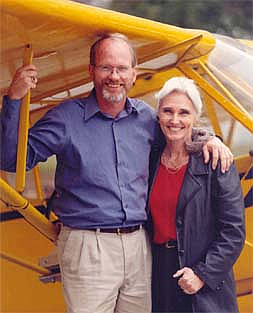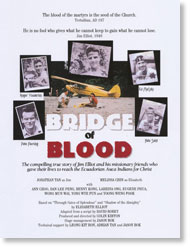Related Research Articles
This timeline of Christian missions chronicles the global expansion of Christianity through a listing of the most significant missionary outreach events.
Elisabeth Elliot was a Christian author and speaker. Her first husband, Jim Elliot, was killed in 1956 while attempting to make missionary contact with the Auca people of eastern Ecuador. She later spent two years as a missionary to the tribe members who killed her husband. Returning to the United States after many years in South America, she became widely known as the author of over twenty books and as a speaker. Elliot toured the country, sharing her knowledge and experience, well into her seventies.

The Huaorani, Waorani, or Waodani, also known as the Waos, are an Indigenous people from the Amazonian Region of Ecuador who have marked differences from other ethnic groups from Ecuador. The alternate name Auca is a pejorative exonym used by the neighboring Quechua natives, and commonly adopted by Spanish-speakers as well. Auca means 'savage'.
Philip James Elliot was an American Christian missionary and one of five people killed during Operation Auca, an attempt to evangelize the Huaorani people of Ecuador.

Nathanael Saint was an evangelical Christian missionary pilot who, along with four others, was killed in Ecuador while attempting to evangelize the Huaorani people through efforts known as Operation Auca.

Mission Aviation Fellowship (MAF) is a Christian organization that provides aviation, communications, and learning technology services to more than 1,000 Christian and humanitarian agencies, as well as thousands of isolated missionaries and indigenous villagers in the world's most remote areas. There are three major operational centers – Nampa, Idaho, United States, Ashford, United Kingdom, and Cairns, Australia. These centres provide operational support to programs in the Americas, Africa and Asia Pacific regions. In 2010, MAF served in more than 55 countries, flying 201,710 passengers with a fleet of some 130 aircraft.

End of the Spear is a 2005 American biographical adventure drama film directed by Jim Hanon, written by Bill Ewing, Bart Gavigan and Hanon, and stars Louie Leonardo and Chad Allen. The film recounts the story of Operation Auca, in which five American Christian missionaries attempted to evangelize the Waodani people of the tropical rain forest of Eastern Ecuador.

Operation Auca was an attempt by five Evangelical Christian missionaries from the United States to bring Christianity to the Waodani or Huaorani people of the rain forest of Ecuador. The Huaorani, also known pejoratively as Aucas, were an isolated tribe known for their violence, against both their own people and outsiders who entered their territory. With the intention of being the first Christians to evangelize the previously uncontacted Huaorani, the missionaries began making regular flights over Huaorani settlements in September 1955, dropping gifts, which were reciprocated. After several months of exchanging gifts, on January 3, 1956, the missionaries established a camp at "Palm Beach", a sandbar along the Curaray River, a few kilometers from Huaorani settlements. Their efforts came to an end on January 8, 1956, when all five—Jim Elliot, Nate Saint, Ed McCully, Peter Fleming, and Roger Youderian—were attacked and speared by a group of Huaorani warriors. The news of their deaths was broadcast around the world, and Life magazine covered the event with a photo essay.

Rachel Saint was an American evangelical Christian missionary who worked in Ecuador.
Roger Youderian was an American Christian missionary to Ecuador who, along with four others, was killed while attempting to evangelize the Huaorani people through efforts known as Operation Auca.
Theophilus McCully was a Christian missionary to Ecuador who, along with four other missionaries, was killed while attempting to evangelize the Huaorani people, through efforts known as Operation Auca.

Peter Sillence Fleming was a Christian who was one of five missionaries killed while participating in Operation Auca, an attempt to evangelize the Huaorani people of Ecuador.
Mincaye Enquedi was a Huao Ecuadorian preacher and church elder. In 1956, he took part in the now infamous attack on five missionaries during Operation Auca. He is believed to have speared both Nate Saint and Ed McCully during the attack.

Stephen Farris Saint is an Ecuadorian-born business entrepreneur, pilot, and author. He is known for being the son of Nate Saint, a famous missionary pilot, as well as for his own work among indigenous tribes.

Beyond the Gates of Splendor is a documentary film that was released in 2004. It chronicles the events leading up to and following Operation Auca, an attempt to contact the Huaorani tribe of Ecuador in which five American missionaries were killed. The film was produced by Bearing Fruit Productions and distributed by Every Tribe Entertainment.

Bridge of Blood: Jim Elliot Takes Christ to the Aucas is a 1973 readers' theatre play based on the story of Operation Auca. It was written by David Robey, a former drama professor at Cedarville University, and produced by Lillenas Drama in 1988.
Frank Drown was an American author and former missionary. He and his wife Marie were missionaries with Gospel Missionary Union and worked for 37 years with the Jívaro Indians of eastern Ecuador, who were known for their head shrinking.
World Radio Missionary Fellowship, Inc., also known as Reach Beyond, is a corporate entity and nonprofit, noncommercial, interdenominational worldwide missionary organization with headquarters in Colorado Springs, Colorado.
Maude Cary (1878–1967) was a Christian American missionary to North Africa, specifically Morocco. She was raised knowing she would one day be a missionary because her parents often housed missionaries as they were passing through. Her parents understood the work they were doing as very important and passed this belief onto their daughter. As soon as she was eighteen, Maude signed herself up for an American missionary training school, Avant Ministries (GMU). After completing this schooling and doing some missions work within American inner cities, Maude was accepted to travel with the GMU to serve alongside a few struggling Christian missionaries in Morocco. For the next fifty years of her life Maude Cary would minister to the rich and poor Muslims within Morocco attempting to bring them the Gospel message her school and parents had taught her. A difficult start made Maude question her efffectivness in Morocco but she trusted that there would eventually be conversions from Islam to Christianity and stayed until she was too ill to serve. Becoming very ill she flew back to America for treatment and as soon as possible returned to continue her life living among the Muslims. Through the difficult start and her illness, Maude Cary became a Christian leader within Morocco for the Gospel Mission Union in charge of translation and Bible schools. She eventually became too sick to continue and returned to the United States. Her hard work in Morocco may not have produced many conversions during her stay there, but there were a few conversions which were seen as a success, and continued the Christian influence within the country long after her life. After fifty years of service Maude returned to the United States because of her illness, and died in 1967.
References
- ↑ Nyquist, J. P. (2007). There is no time, a missionary fable. Avant.
- ↑ The Gospel Message, Vol. 110 No. 1, pg. 4, 7, 12, 16 .
- ↑ Christian Management Report, vol. 28, no. 6, pg. 5-8
- ↑ Drown, F., Marie, D. F. A., & Drown, M. (2002). Mission to the headhunters, how god's forgiveness transformed tribal enemies. Christian Focus.
- ↑ "Go ye and preach the Gospel.", Life, vol. 40, no. 5, January 30, 1956, pages 10-19.
- ↑ Drown, F., & Drown, M. (2010). Unmarked Memories: Five friends buried in the jungle of Ecuador. Avant Ministries.
- ↑ Elliot, E. (1987). Through gates of splendor. Tyndale House Publishers, Inc.
- ↑ "Avant Ministries - History". Archived from the original on 2011-12-06. Retrieved 2011-12-03.
- ↑ "Church Partnerships - Avant Ministries". www.avantministries.org.